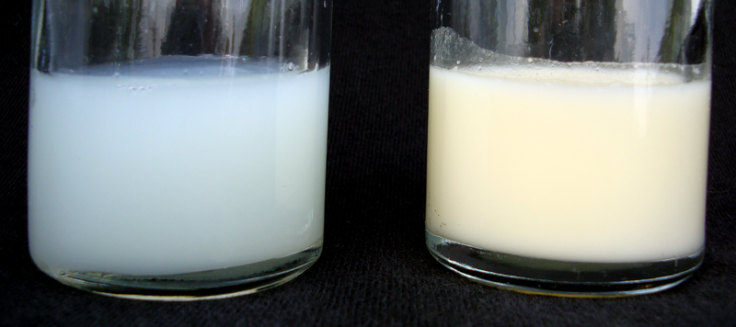6 Surprising Natural Uses For Breast Milk

Breastfeeding is an experience that can bring a mother and child closer to one another — and possibly an entire family. According to the Centers for Disease Control and Prevention (CDC) National Immunization Survey, 73.9 percent of U.S. infants born in 2006 were breastfed — with 43.4 percent still breastfeeding at six months of age. While the World Health Organization (WHO) recommends mothers to continue breastfeeding for up to two years of age or over to maximize the child's nutritional value, family members can also soak in the benefits of breast milk. Breast milk benefits extend beyond mother and child, as adults of all ages can find natural uses for human breast milk to improve their overall health.
Recently in China, breast milk is seen as the "drink of the wealthy" among the inhabitants of Shenzhen, Guangdong Province who have reported to be in poor health. In parts of China, there is the belief that human breast milk contains the most nutritional value for people that are ill, reports the Southern Metropolis Daily. The antibodies in breast milk, IgG, IgA, IgM, IgD and IgE, which are secretory IgA molecules, combat diseases without causing inflammation. This is why breastfed babies are often protected from various illnesses such as diarrhea, respiratory infections, gastrointestinal disease and even asthma symptoms. In a study published in the European Respiratory Journal, researchers examined the association between breastfeeding duration in relation to risks of developing asthma-related symptoms in more than 5,000 preschool children. The results of the study showed that children who were breastfed for a short period of time and for six months were less likely to have wheezing symptoms from one to three years of age compared to their counterparts who were more likely to experience a greater reoccurrence of these symptoms.
While human breast milk may not be able to alleviate asthma symptoms in adults, the application and consumption of human breast milk can act as a medicinal aid to treat at-home common ailments for the entire family. So, if you have some extra breast milk laying around in the house, don't let it go to waste and put it to good, natural use!
Breast Milk As An Ear Treatment
Ear infections most commonly occur from the ages of six to 18 months, says the University of Maryland Medical Center. A natural remedy to treat an ear infection in infants and even adults is to put breast milk in the ear canal because of the antibodies found in milk, says Dr. Joseph Mercola. Three to four drops of breast milk into the baby's ear will suffice, and the drops should be administered at the entrance of the ear canal, not directly into it.
Breast Milk As An Eye Treatment
Mothers have often used breast milk to treat conjunctivitis — viral, bacterial, and allergic. A probiotic-laden non-acidic liquid can be used to treat viral conjunctivitis, commonly known as pinkeye. Human breast milk has proven to be the most effective liquid to treat babies and children with the eye infection. Two drops of breast milk in addition to a clear eyedropper into the infected eye will get rid of the infection in a jiffy. "Breast milk has been used by mothers (probably for many years) to treat infectious conjunctivitis, but hold off on this idea until you speak with your doctor," Debbi Donovan, a board certified lactation consultant, told iVillage
Tip:
Breast milk can also be used as a contact lens solution for cleansing.
Breast Milk As A Sore Throat Soother
The consumption of, or simply gargling with, breast milk can soothe a sore throat. If a newborn has a sore throat, it is highly encouraged to give him or her some breast milk to alleviate the symptoms.
Breast Milk As A Burning, Itching and Stinging Ointment
If you have a cut that is causing burning, itching, or stinging on your body, you can disinfect it using breast milk. A slight drop of human breast milk on the infected area as it simmers on the cut will help heal the wound. Due to the antibodies found in breast milk, specifically IgA, the liquid helps prevent germs from growing on the site of injury.
Breast Milk As A Facial Cleanser
If you have acne, or a skin disorder, breast milk can be a cost-effective solution. According to University of California San Diego scientist, Dissaya Pornpattananangkul, lauric acid can help treat teenage acne, reports the Telegraph. To use breast milk as an acne solution, use clean water all over your face and then apply breast milk all over the infected area and let it air-dry. As a facial cleanser, the breast milk should be applied over the entire face and then wiped away clean with a towel.
Breast Milk As A Cooking Ingredient
Breast milk has been used as a substitute for cow's milk in coffee and cereal. The nutrients found in human breast milk are not found in regular milk. The human milk's human alpha-lactalbumin made lethal to tumor cells — also known as "Hamlet" — are compounds that have been linked to killing 40 types of cancer cells in tests, says the National Institutes of Health. The Learning Channel's website has a "Mommy's Milk Cheese" recipe for those daring souls who want to cook with the nutrient-packed human milk.



























